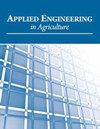观点:标杆机会有助于受控环境农业中的循环粮食系统
IF 0.8
4区 农林科学
Q4 AGRICULTURAL ENGINEERING
引用次数: 1
摘要
受控环境农业设施可以实现比野外耕作更好的资源效率和生产力。农业粮食系统为社区提供了弹性和经济效益。有效的受控环境农业战略可以通过回收材料和使用闭环系统方法减少固体废物和废水排放。基准测试是测量和验证的关键,认证体系可以鼓励和促进循环。控制环境农业(CEA)方法为循环经济系统提供了途径。CEA设施具有提高气候适应能力和有效利用土地的潜力。在面对资源短缺的情况下,CEA操作中的循环水实践可以大大减少水的使用。与粮食生产有关的温室气体排放仍然是田间农业和环境污染设施的主要关切。基准工具和认证计划可以鼓励和促进循环系统。关键词:循环经济,能源,温室,温室气体排放,生产力,保护性农业,再生,弹性,垂直农业,水本文章由计算机程序翻译,如有差异,请以英文原文为准。
Perspective: Benchmarking Opportunities Can Contribute to Circular Food Systems in Controlled Environment Agriculture
HighlightsControlled Environment Agriculture facilities can achieve better resource efficiency and productivity than field farming.Controlled Environment Agriculture food systems provide resiliency and economic benefits for communities.Efficient Controlled Environment Agriculture strategies can reduce solid waste and wastewater emissions by recycling materials and using closed loop system approaches.Benchmarking is key to measurement and validation and certification systems can encourage and promote circularity.Abstract. Controlled Environment Agriculture (CEA) approaches offer pathways to circular economy systems. CEA facilities have the potential to offer increased climate resiliency and efficient use of land. Recirculating water practices in CEA operations can substantially reduce water use in the face of resource scarcity. The greenhouse gas emissions associated with food production remain a major concern for both field agriculture and CEA facilities. Benchmarking tools and certification programs can encourage and promote circular systems. Keywords: Circular economy, Energy, Greenhouse, Greenhouse gas emissions , Productivity, Protected agriculture, Regeneration, Resilience, Vertical farming, Water.
求助全文
通过发布文献求助,成功后即可免费获取论文全文。
去求助
来源期刊

Applied Engineering in Agriculture
农林科学-农业工程
CiteScore
1.80
自引率
11.10%
发文量
69
审稿时长
6 months
期刊介绍:
This peer-reviewed journal publishes applications of engineering and technology research that address agricultural, food, and biological systems problems. Submissions must include results of practical experiences, tests, or trials presented in a manner and style that will allow easy adaptation by others; results of reviews or studies of installations or applications with substantially new or significant information not readily available in other refereed publications; or a description of successful methods of techniques of education, outreach, or technology transfer.
 求助内容:
求助内容: 应助结果提醒方式:
应助结果提醒方式:


